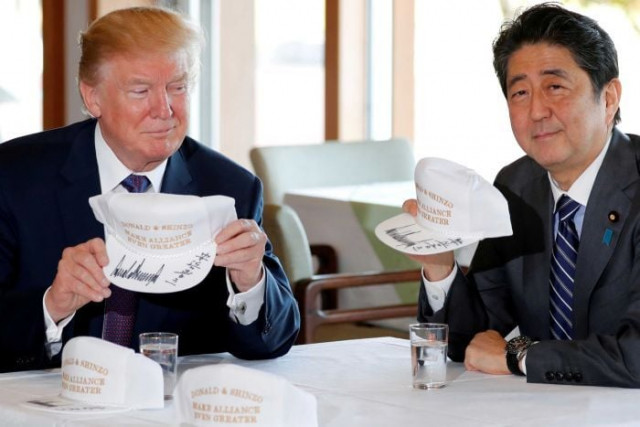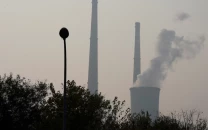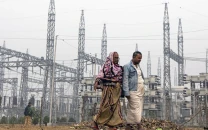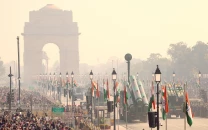Trump hosts Abe with North Korea, trade on the agenda
The Japanese prime minister will make his second visit to Trump’s ostentatious Palm Beach, Florida estate

Long-distance relationships are complicated, says analyst
PHOTO: REUTERS
The Japanese prime minister will make his second visit to Trump's ostentatious Palm Beach, Florida estate, when the focus will be on trade and security.
Last year, Trump and Abe traded fist bumps and high fives as they snuck in a round of golf in Palm Beach and a return leg near Tokyo, tucking into burgers with ketchup for good measure.
North Korean leader meets Chinese senior official, fetes Chinese art troupe
"Obviously, the president has got a great relationship there," said White House press secretary Sarah Sanders looking forward to meetings this Tuesday and Wednesday.
But with Abe's approval rating languishing at its lowest level in years and Trump mired in controversies and crises too numerous to list, both are under pressure.
"Long-distance relationships are complicated, and the stakes of their second rendezvous at Mar-a-Lago this week are high," said Mireya Solis of the Brookings Institution.
Trump's decision to hold an improbable summit with North Korea's Kim Jong Un this May or June was announced without consulting Abe. And worse, it was announced by a South Korean official.
Since then Tokyo officials have watched in horror as China and South Korea - an ally, but an uneasy one - take on a more direct hand in influencing the outcome of a nuclear crisis that places Japan's very existence in question.
Pyongyang has lobbed test-missiles over the sea of Japan, triggering public warning alerts. The abduction of Japanese citizens by North Korea remains a high profile domestic issue.
As he left Japan, Abe told reporters that he would be reiterating Tokyo's "maximum pressure" policy towards Pyongyang, and that the "important abduction issue" would be high on his agenda.
"I will use all my strength so we see progress towards resolution of the abduction issue," he said.
Trump could do with a political victory - perhaps in the form of opening up trade negotiations with Japan as he seeks to calm an increasingly restless and crisis-weary base.
His recent decision to order air strikes in Syria has soured supporters who believed that his "America First" policies would spell an end to Middle Eastern military intervention.
This comes just weeks after signing a budget that exploded spending -- infuriating Republican fiscal hawks - without paying for his much-promised wall along the border with Mexico.
Both decisions may be the result of campaign promises running into reality, but have prompted prominent supporters to balk.
Conservative pundit and longtime cheerleader Ann Coulter went as far as pillorying Trump as a "shallow, lazy ignoramus."
Amid the tumult, Trump has taken a harder line on his promise to rewrite the global terms of trade in America's favor.
"It is a well-rehearsed habit of Trump's to ramp up the rhetoric on trade when he's in a political pinch, to fire up his base," said Solis.
Trump has announced tariffs on billions of dollars worth of Chinese imports, hit out at what he called European Union protectionism and warned he may walk away from a longstanding trade deal with Mexico and Canada.
North Korea's Kim greets Chinese official, calls for stronger ties
"Our country has been taken advantage of for many, many years," he said at an event in Florida on Monday. "They're being renegotiated. We're straightening them out."
Abe was cautious on the issue ahead of the talks, saying only that he would "exchange opinions based on our shared understanding that Japan and the United States will lead the economic growth of the Indo-Pacific region through free and fair trade."
So far Trump has proven flexible about Abe's reluctance to begin negotiations on a free trade agreement.
But the country's protectionist agriculture and auto markets could well be Trump's next target, unless Abe can use his friendship to tee-up a compromise.


















COMMENTS
Comments are moderated and generally will be posted if they are on-topic and not abusive.
For more information, please see our Comments FAQ